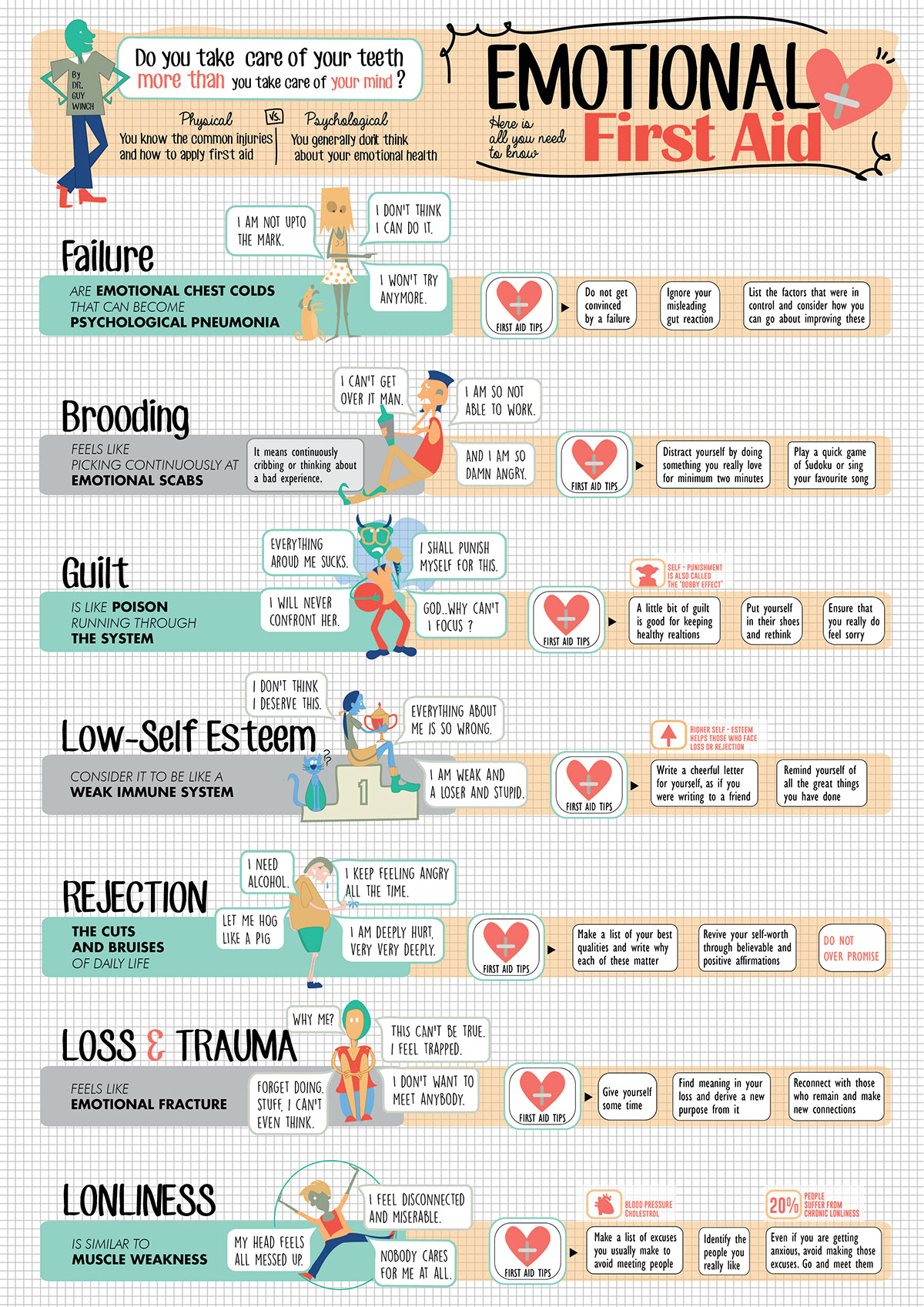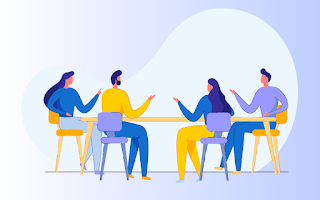Emotional first-aid
“Emotional pain should not and need not be a constant companion. Do not
let it become one.” - Dr. Guy Winch
When you scrape your knee or fracture your leg do
you think twice before approaching a doctor and rushing for immediate
first-aid. So, when we are hurt emotionally why don’t we use first-aid for our
mental health. Emotional injuries can be as hurtful as physical injury.
Emotional first aid is identifying strategies to cope with psychological
injuries.
Dr. Guy Winch a well-known psychologist in his approach to emotional
first-aid said, "I always assume, and I think I assume correctly, that a
lot of people don't ever stop to take their emotional pulse. Their emotional
health doesn't mean anything to them at all”. In his book “Emotional First Aid: Practical
Strategies for Treating Failure, Rejection, Guilt, and Other Everyday
Psychological Injuries” highlighted some specific psychological injuries and
how we can overcome them.
He highlighted these 7-common forms of
psychological injuries for which you can use emotional first aid:
- Rejection
- Failure
- Loneliness
- Loss
- Brooding and Rumination
- Guilt
- Low Self-Esteem

Seven ways to practice emotional first-aid
"We often neglect our psychological wounds until they become severe enough to impair our functioning.” -Dr. Guy Winch
Recognize when you are in emotional pain: The first and the most important step in emotional first-aid is
identifying that a psychological injury exists. When you sustain a physical
injury, you experience a physical sensation of pain or a visible injury may
occur indicating a physical injury. Similarly, when you are experience episode
of prolonged bad mood, anger or feeling of loneliness it indicates a
psychological injury. It is important you acknowledge that you are experiencing
psychological injury causing emotional pain.
Redefine your perspective of failure: Psychological injury may lead you to engage in negative thought process. Failure may lead you to believe that you won’t be able to do anything in life which would lead you to focus only on your limitations. To avoid this process, you may focus on things which are in your control rather than focusing on things you can’t control. When you fail ask yourself what have your learnt from this experience and what could you have done differently to avoid the situation in future. You may be more prepared next time you encounter similar situation.
“Failure is so common a human experience that what
distinguishes us from one another is not that we fail but rather how we respond
when we do.” – Dr. Guy Winch
Practice self-compassion: When you experience negative thoughts about yourself which increase your emotional pain and impact your self-esteem practice self-compassion. Compassion is the ability to be empathetic and loving, and being concerned for people who are in difficult situation, and self-compassion is simply the ability to direct these emotions to oneself, predominantly in the face of failure.
Distract yourself from rumination: Replaying distressing events over and over again will deepen your emotional pain. To disrupt unhealthy and negative rumination is to distract yourself by engaging in a task that will divert your attention and requires concentration. Trying to achieve perfectionism and setting unrealistic goal can also lead to rumination. Set realistic and achievable goals, make a plan to achieve them and implement the plan.
“Intense ruminations can often make us so focused
on our own emotional needs that we become blind to those of the people around
us and our relationships often suffer as a result.” -Dr. Guy Winch
Find meaning in loss: Loss can leave deep wounds and stop us from moving forward in life. An important strategy is to find meaning in the loss, think of what you’ve gained from the experience i.e. finding gain in pain. Examine and appreciate what truly matters and what is valuable in life. Don’t forget to practice self-care (Use this link to understand different methods of self-care https://www.thecyanproject.org/2020/04/understanding-self-care.html ).
Don’t let you guilt takeover your growth: Prolonged guilt makes it difficult for us to focus on or responsibilities and it can impact our relationships. One of the best ways to resolve guilt is to offer an effective apology. Empathize with the person and offer genuine apology which includes understanding how your actions impacted others. It is easier to forgive someone when you feel truly understood. Genuine apology helps in resolving your guilt quickly.
“The effects of excessive or unresolved guilt
impair our communication with the person we've harmed and limit our ability to
relate to him or her in an authentic manner.” -Dr. Guy Winch
Identify which strategies work for your emotional pain: Identify which method works the best for you when you face psychological injuries just as you would identify which medicines suit you during physical illness. How you did you tackle the situation in past. Take note of what could cause stress in your daily life, identify your coping methods. Don’t delay in implementation of your coping skills. You may prepare a comfort kit for yourself to use during distress (Use this link on how to make a comfort box: https://www.thecyanproject.org/2020/04/amidst-chaos-find-your-peace.html ).
This article highlighted only few methods of
emotional first-aid, read “Emotional First Aid: Practical Strategies for
Treating Failure, Rejection, Guilt, and Other Everyday Psychological Injuries”
by Dr. Guy Winch to learn more about specific first-aid for specific
psychological injury.
You may also watch Ted Talk by Guy Winch on “Why we
all need to practice emotional first aid” - https://www.ted.com/talks/guy_winch_why_we_all_need_to_practice_emotional_first_aid

SB


Comments
Post a Comment